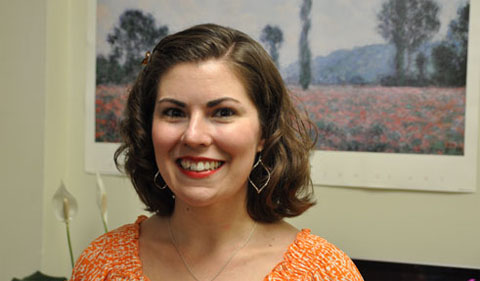
English department doctoral candidate Renee Benham
Renee Benham, a doctoral candidate in English, traveled to London to research nursing in 19th-century literature.
She was awarded a competitive scholarship from Ohio University’s English Department, one of eight to students who are conducting research for their respective dissertations and projects.
ABSTRACT: “Beyond Nightingale: The Transformation of Nursing in Nineteenth-Century Literature”
Nursing programs today, like the one at Ohio University, are highly competitive, and the requirements for entry into nursing programs focus on education and training, rather than on personal moral character. Since nurses interact with us often when we are most vulnerable, we expect quality care with a sympathetic hand. These things do not seem unusual to us, and yet they were each hard fought battles in the 19th century. Most people, including nursing students, have no idea that early 19th-century nurses were low-class, slovenly, drinking, and smoking old women who were described by the author of an 1828 nursing manual as “an unavoidable evil” (The Good Nurse 28-29). This hired nurse was the last thing a person wanted in their home, yet there was no alternative.
By the end of the century, however, this had radically changed. Florence Nightingale contributed to the professionalization of nursing, yet she was just one moment in an exciting cultural transformation. Nursing was one of the multiple professions opening to women in the second half of the century due to a shifting understanding of the role of women, as well as downright financial necessity as millions of women were forced to support themselves. While historical accounts of nursing have already been written, and literary scholars have explored specific elements here and there, my medical humanities project charts a comprehensive literary history of nursing through the nineteenth century and into WWI.
Literature does not merely reflect a cultural transformation; rather, it creates a space where ideas are negotiated and redefined. I argue that 19th-century literature facilitated the nursing transformation by systematically addressing and alleviating social concerns tied to women entering the public sphere as paid caregivers: fears that these women would be too independent from men, low-class, vulgar, and unfeminine.
The fifth chapter of my dissertation examines how nursing embraced the value of efficiency, moving it further from its domestic roots and towards a modern profession. With the funds from the English Department summer scholarship, I traveled to London and spent two weeks in the archives of the British Library, Imperial War Museum, and British Red Cross, examining documents from the creation and operation of the Voluntary Aid Detachments (VAD). VADs were created before World War I, yet are famous now for their tremendous work during the war. The British Red Cross, in partnership with St. John of Jerusalem, trained, organized, and mobilized tens of thousands of volunteers, mostly women, in the care of sick and wounded soldiers both locally and abroad.
I was able to examine nursing manuals produced by the British Red Cross in the early 1900s, documents from the Voluntary Aid Department London office, as well as the Red Cross Magazine, among others. These texts, as well as those by other nursing organizations, will reveal how nursing evolved as it moved into the twentieth century and into World War I, becoming the profession we recognize today.



















Comments